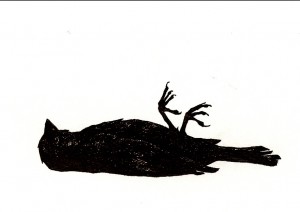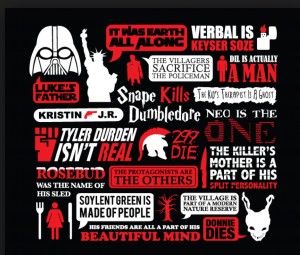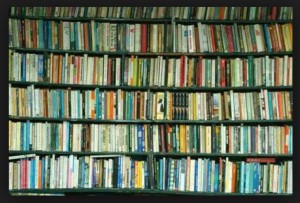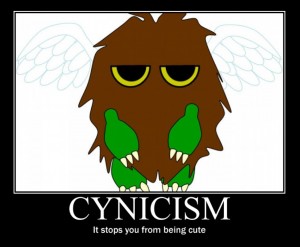SF Mistressworks Project
 THE SF MISTRESSWORKS PROJECT is an excellent list of SF written by women. And I’m not just saying that because Fool’s War is #92.
THE SF MISTRESSWORKS PROJECT is an excellent list of SF written by women. And I’m not just saying that because Fool’s War is #92.
 THE SF MISTRESSWORKS PROJECT is an excellent list of SF written by women. And I’m not just saying that because Fool’s War is #92.
THE SF MISTRESSWORKS PROJECT is an excellent list of SF written by women. And I’m not just saying that because Fool’s War is #92.
 THE DEAD CHICK
THE DEAD CHICK
NOTE: I’m going to be talking unromantically and uneuphemistically about sex here, and ranting a bit. If you’re under 18, there are people who will think you shouldn’t read this. Please consult your own conscience and tolerence levels.
Okay. Here we go.
I have a problem with the end of The Big Book.
There was a lot to like here. The historical writing was particularly luscious. There are passages I want to shove under the nose of a number of authors I could name and say “See? See? Here. THIS is how you write about women and their friendships. This. Right here.” In parts there is a de-romanticization of the way men see women, that famous “male gaze” that is interesting, worthwhile and highly self-aware.
Then we get to the end, and what happens?
Wait for it…
I don’t expect a whole lot of people to read this book, if they can find it, but because this is the internet, I’m going to do this anyway.
SPOILER ALERT!

Okay? Okay. Oh, BTW, there’s also a rant coming.
Okay? Okay.
So, we get to the end, and what happens?…wait for it…In this time-looping book where we slip from present to past, between points of view and narrative styles and complexity, we get the most prosaic possible ending for the heroine. That’s right. The modern girl dies.
Why does she die? Because that’s what happens to abused women. Everybody knows that. Take a look down the line in movies and literature. When nobody can save them, they die.
Oh, it’s all terribly tragic. Just like that masterpiece of modern feminism, Thelma and Louise. This brilliant young woman is so unable to overcome the abuse inflicted on her by her father, and the exploitation of her professor, etc., that despite her brilliance and the discovery of genuinely good people in her life, and getting to be in the place she’s always wanted to be and meeting the kinds of people she’s always wanted to meet, she kills herself. Why? Well…because she does. It’s the tragedy of it, isn’t it? She was abused and she killed herself. That’s what happens, right?
And the author really piled it on. He made it very clear that this was in the end no garden variety abuse, and that, of course it wasn’t her fault, she was so traumatized, etc., she just kept seeking out situations where she was going to be abused. You know, it was one of those long, drawn out suicides.
For the record, I am very, very aware that exploited women do kill themselves. But you know what? They also don’t kill themselves. They suffer and they die, but they also suffer and live. Kind of a lot. But you wouldn’t know it from literature.
I am so, so, SO sick of the dead chick ending. It is not a new statement. It goes back centuries. Woman has a voluntary or involuntary sexual experience that is not within the codified bounds, and BOOM! Gotta die. Either because deviating from the strict code of conduct set by society has got to be seen as suicidal, or because it’s so, terribly, terribly, terribly tragic.
Oh, if she gets pregnant, maybe she gets to live for the baby’s sake, but living just because she wants to live? Not so much.
Maybe it was worth is when Thomas Hardy was writing Tess of d’Ubervilles, but in the 21st it’s cheap tragedy, right up there on the level with a story where the Big Surprise is that the hero’s gay. It’s also obvious tragedy. It’s easy. Of course she dies, because it was all. So. Horrible.
I’ll tell you something else — killing the victim it is NOT a feminist or feminist-ally statement. You know what would be? If the victim lived. If she survived what had happened and somehow managed to heal, even a little, without having to go through being pregnant for the privilege. If the exploitative professor was forced to confront the living woman, rather than just the corpse. THAT would be a profound statement.
Or if he died instead. You’ll notice the man never dies in these scenarios. He never kills himself because he can’t handle what he’s done or what he’s learned. Ever wonder why the woman is always the one who’s got to die?
With all that was new and wonderful and beautifully written in this book about survival, and history and faith, about ways to fight and ways to cope, and the beauty of the world and THIS is the best this character we’ve spent over a thousand friggin’ pages with gets? A bland, dull, worn out repetition of one of the oldest and most worn out tragedies. So sad. Next.
Close the Big Book on a sour note.
 NO MORE TIME TRAVEL THAN STRICTLY NECESSARY PLEASE
NO MORE TIME TRAVEL THAN STRICTLY NECESSARY PLEASETHIS POST CONTAINS SPOILERS FOR THE BOOK REVOLUTION BY JENNIFER DONNELLY.
Okay? Okay.
So, I took a break from reading The Big Book and read a smaller book also on the 6ft tall TBR Pile of Doom — Revolution by Jennifer Donnelly. Overall, very good. Emotionally gripping. Wasn’t sure about it at first, the emo at the opening felt a bit…obvious. But it all settled down.
And then I found out that Revolution and The Big Book both pull a similar trick. Both jump from modern times to the past. Both have a modern person looking back at the life of a doomed historical person. Both portray the past very, very well, and weave the tension between past and present very, very well.
Then both insert a person from the present into the past — in the case of The Big Book via a play written by one of the modern protagonists, and in Revolution by an actual (or was it all a dream?) act of time travel, via the time honored means of the blow to the head.
In both cases, all that emotional tension drops out of the narrative like air out of a balloon. Both authors have done such a terrific job of creating the separate worlds, the separate problems and the separate POVs the change just feels cheap. Gimmicky. It’s a narrative layer I not only don’t need, I actively don’t want, because what I’ve got has been so lovely.
It’s a lesson about the importance of simplicity, even within complexity. Note to Self: Sometimes it’s worth it not to take that extra step, and flow, familiarity and follow through can be more important and more effective than that final twist.
And no more time travel than strictly necessary.
 FRIENDSHIP
FRIENDSHIP
As you might expect, HUNGER’S BRIDES, otherwise known as The Big Book, is a complicated book. Wow, is it complicated.
It’s a time-jumping novel. Not time travel, but it divides its storyline between the story of a modern girl, mostly told from the point of view of her professor who was a self-excusing womanizer, and who was sleeping with her because she was pretty and didn’t think much of it (yeah, he’s a peach of a guy), and never bothered to understand that she had issues. Okay, not issues. She had subscriptions — abuse leading to anorexia and other self-destructive behaviors. The other part of the story of Sor Juana Inez Delacruz, who was a scholar and nun in the time of Imperial Mexico and ultimately falls afoul of the Inquisition.
It’s an ambitious trick, and when you’re doing it in 1300 pages, it’s pretty natural that some bits would succeed better than others. I want to talk about one of the places that really succeeds. The depiction of friendship.
Female friendship is something a lot of authors seem to grapple with. In SF, we’ve gotten used to seeing a woman paling around with the guys particularly if she’s a military officer, a kick-ass heroine of some sort, or a prostitute. But she’s on her own. She gets to be friends with the guys and fall in love with them, but friends with other women? Nope. Not there.
In The Big Book, there are lots of friendships for Sor Juana. Her life is not ideal. She’s tightly cloistered, but within the cloisters, she has a tight circle of friends, and Anderson portrays them very believably. They’re genuine, complicated, have good days and bad days, little secrets, little confidences, big blow ups, small ones, attempts to help that are sometimes clumsy, sometimes successful and always human. Not afraid of this strange world, not afraid to show these people as fully human.
It made me so happy. It’s a simple thing, but I can’t help thinking that the portrayal of friendship is startlingly absent from a lot of genre fiction, especially for women. It’s one of the reasons I love the Thor movies. Dr. Jane Whose-last-name-I-never-Remember has a friend, one who is roughly her age and is also a woman. They talk, they tease, they help each other out. Stop a second and do a count. What other genre movies have you recently seen where there’s a scene between women friends? Go ahead. I’ll wait. I’ve got the most recent Hunger Games, and even there it’s sketchy, and Frozen, which is between sisters. How about you?
Interestingly, the miserable, abused, self-destructive modern woman has no women friends, not currently. She meets up with an old friend during the course of the book but does not let herself stay with that woman. She doesn’t make any new female friends.
For all of us, gender aside, friendship is a huge part of our world. We get so caught up in talking about sexual relationships, we forget about the complexities, the intricacies, the vitality and absolute importance of friendship. We need to remember more, inside the genre and out of it.
I’m starting over, again.
This is nothing new. The life of the writer is about starting over. Fiinsh one project, close it out, hopefully send it out, and start the next. If you are not living this cycle, as a writer, you are doing something wrong.
That doesn’t mean it gets easier.
This time I’m starting over on the last book of a series — Palace of Spies, Book 3. So far, I’ve got a lot of characters, a time line, a deradline and no plot. At all. None. Zip.
I’m not panicking, just a little frustrated. I know that whatever plot I may have thought I had, as I write, it will change, kind of a lot. Okay, you can take the kind of out of that sentence. It will change a lot. But I do need to have at least some kind of line of sight so I can start stringing words together.
But rest assured, Dear Reader, Peggy and Friends will be back. I’ve left the door open, and the coffee is waiting. I’m quite sure there is nothing to be alarmed about. After all, what could possibly have happened to them?
Oh, wait…this is Peggy we’re talking about, right?
Time to get started over…
TROPHIES
 I belong to the Subculture of the Book. In my culture, books are not just containers for words, they are prizes, trophies, and they come with bragging rights. I have had whole conversations with friends about how many books we own, how many new bookshelves we’ve had to buy; the problem of trying to squeeze one more bookshelf into a small house or apartment; how many individual volumes we own and whether they’re double stacked on those shelves. We bemoan the difficulties of book storage and management in that particular way that is really kind of closer to bragging than actual regret. And we always buy more books. The size of your To Be Read pile is a big part of the Subculture of the Book.
I belong to the Subculture of the Book. In my culture, books are not just containers for words, they are prizes, trophies, and they come with bragging rights. I have had whole conversations with friends about how many books we own, how many new bookshelves we’ve had to buy; the problem of trying to squeeze one more bookshelf into a small house or apartment; how many individual volumes we own and whether they’re double stacked on those shelves. We bemoan the difficulties of book storage and management in that particular way that is really kind of closer to bragging than actual regret. And we always buy more books. The size of your To Be Read pile is a big part of the Subculture of the Book.
Ebooks have not changed any of this. That may be because I hang out with fellow geezers, but there you have it.
The Big Book is emblamatic of my culture. I did buy it because I was curious about the contents. But I also bought it simply because it was big and beautiful and I wanted it. Some people do this with shoes or cars. I do it with books. And clothes. But mostly books.
Lately, though, I’ve begun to question the subculture of the Book, and I hate to say, it’s in part because of the Big Book. It’s turned out to be a good book. There are parts of it that are really brilliant. But like I said in my previous post, this Big Book sat on my shelf for years, and it had plenty of company. That shelf? Let me show it to you. It’s six feet tall, four broad and it’s stuffed with books I haven’t read. And I keep buying more and piling them in. I mean there’s a TBR pile and there’s hoarding. If books were cats, the neighbors would have called the humane society by now.
A few years ago, I tried be systematic about things. I was going to start at the top left of the shelf and read every book in order. I mean, I bought them, right? I bought them because I wanted to read them, not just own them right? What is the point of a book you don’t read?
That effort, I confess failed miserably. So, there it sat, big and beautiful and completely unread, with all those other beautiful, unread books.
Books are a good thing. You can never have too many, right? This is practically the motto of the subculture of the Book. And yet…and I ask this seriously…what is the point of having more than you can read?
Has counting coup and the luxury of ownership become more important to me than the stories?
 I’ve been reading for research lately. This has led me into the realm of the Published Rant. Which has in turn, led to the following:
I’ve been reading for research lately. This has led me into the realm of the Published Rant. Which has in turn, led to the following:
LETTERS TO A CYNICAL WRITER
By Anne Author
Dear M. Writer:
I understand that you are Cynical. I understand that you have seen much of the world and that you are wearied and angered by it all. I understand that beside you I am a Babe in the Woods. After all, who am I? A mere provincial Romantic who still might take things at face value, and who might still enjoy what is nice, pleasant, charming or, well, Romantic. I understand that you are here to open my eyes, to save me from the evils of trust and romanticism and, most of all, to show me the Truth. And the Truth is going to be unpleasant. You know this because you have seen it and that is why you are Cynical.
However, M. Writer, if you are going to tell me the Truth, and are going to make the scales fall from my eyes, there are several things you are going to have to do first.
If you wish to shock me out of my nievete, you are going to have to show me something new. Contrary to what you may believe, I have heard coarse language. As a resident of the twentieth and twenty-first centuries, I have been exposed to bodily fluids and know several homonyms for them. Showing them to me with unusual backdrops does not shock me. It might, however, lead me to mistake you for a frat boy rather than a cynic, and have me wondering if the fart references are coming next. Further, I am aware that people get drunk and behave badly in public, especially if they are rich and/or famous. Informing me that this happens produces no revelation, but may induce a discreet eye-roll in your direction.
I am likewise acquainted with several of the common, or garden-variety, forms of hypocracy and greed. Telling me they exist, especially among the rich and famous (or the service industries) likewise fails to cause a blanch to fall over my delicate complexion. I am likewise unmoved by graphic violence or invocations of Hitler or Stalin. I am also aware that advertising frequently disguises the slip-shod and/or unhealthy and that corporations do not have my best interests at heart. Merely declaring the aforementioned conditions to be so without naming names, citing specific incidents, refering to interviews with participants or experts does not enlighten, or, more importantly, shock.
If you are writing in the non-fiction vein and seek to convince me of the superiority of your view, of your experience, of the Truth of which you speak, you must impart actual information. You cannot simply inform me, for example, you hate your job, and then go on, and on, and on, about how “it” is all a racket without proving to me that you also know something about the history of the racket, of the world you are so sorry you inhabit, and that perhaps, you have talked to some of the people your are talking about. Otherwise it might appear that you are simply reporting the worst forms of gossip in order to reinforce your own view. You might also wish to give me some background on the people you are complaing about, and detail to me the claims they make which you are debunking so that I know how badly they are attempting to lead me astray.
Further, you must learn to organize your information. Just because you are vivisecting a subject and/or person that’s no reason to take a hatchet to it. Concise, deliberate cuts will produce an adequate amount of exasanguination and will be much easier for me, the unenlightened reader to follow. A mastery of basic essay style will assist you here. I cannot be properly shocked by what you are telling me if you do not follow through on your thoughts, or present me a theme with at least a modicum of follow-through so I can see the strength of your arguments.
If you are writing in the fictional mode, please keep in mind all of the above, but in addition, be aware that while as a reader, I must be made to care. I cannot simply be faced with a list of woes and warbling off-key angst about the inequities of the world. If my Romanticism has persisted this far, it will take the strongest of arguments to shake me out of it. It will take a thoughtful character, a new presentation, a tightly-focused insight. It will take an author who has read widely as well as lived widely and can present the triumph so the ultimate failure, which is the province of the Cynical Writer, can reach me all the more deeply.